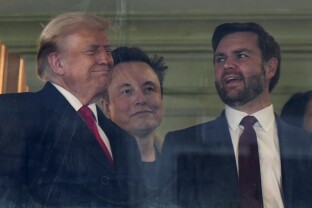On Wednesday night, as House Republicans were rethinking whether Mike Johnson should keep the speaker’s gavel next year, Rep. Troy Nehls pointed out the problem with those questions.
“Who’s going to do it?” the Texas Republican wondered. “If it’s not Mike Johnson, then who is it going to be?”
Some Republican lawmakers think they’ve landed on an answer. A couple of them are openly offering support to Elon Musk, the billionaire and Trump adviser who almost single-handedly tanked a bipartisan spending package this week.
“I’d be open to supporting @elonmusk for Speaker of the House,” Georgia Rep. Marjorie Taylor Greene wrote on Thursday morning. “The establishment needs to be shattered just like it was yesterday. This could be the way.”
Kentucky Sen. Rand Paul kicked off the conversation by pointing out on Thursday that the speaker doesn’t technically have to be a member of Congress. “Nothing would disrupt the swamp more than electing Elon Musk,” he wrote. “Nothing’s impossible.”
As a member of the Senate, Paul won’t actually have a say. And the prospect of an outsider becoming House speaker seems close to impossible, even if it’s allowed. Members have historically preferred to elect one of their own — a leader who understands their conference, the legislative process and the institution. (Musk’s complaints about the spending package on Wednesday were riddled with factual errors, raising questions about his own knowledge of Congress.)
Sen. Mike Lee, who also won’t have a vote, likewise is pushing for either Musk or his partner on a cost-cutting advisory board, former GOP presidential candidate Vivek Ramaswamy, to be speaker. “We’re going to need new leadership,” he said Thursday. “We need to go outside the box.”
The razor-thin Republican majority will have almost no room for disagreement in January if members want to elect a speaker at all. There’s precedent for protracted fights. At the start of the 118th Congress, it took more than a dozen votes before Rep. Kevin McCarthy claimed the gavel. And in the pre-Civil War era, it once took members two months to select a speaker.
Of course, GOP lawmakers will want to hear President-elect Donald Trump’s endorsement, and Trump isn’t sure if he’ll support Johnson or not.
Musk would certainly face opposition: “The idea of Musk becoming the speaker is about the most stupid thing I’ve ever heard,” a different GOP lawmaker, who asked to speak anonymously, told NOTUS after Greene’s post.
Other Republican lawmakers weren’t familiar with the chatter. “I haven’t heard that,” Wisconsin Rep. Derrick Van Orden told NOTUS.
“I don’t know,” he added.
Rep. Mike Collins also said he hadn’t thought about it. “We’ve got a lot of pressing issues right upon us right now,” he said.
Rep. Robert Aderholt of Alabama, meanwhile, wasn’t too sure. “I’m not sure he would want the job,” he told NOTUS. “I think he’s got his hands full.”
Nehls also had the painful fight between House Republicans following McCarthy’s ouster at the top of his mind. In the Republican House, nothing is ever easy.
“We talked about this, what, almost a year ago when we were going through this,” Nehls said, referring to the month House Republicans spent agonizing over who should lead them. “Are you going to go deep into the bench again? Are we going to find — I mean, who can get there? I’ve always said the Lord Jesus would have a very difficult time managing this conference.”
—
Haley Byrd Wilt is a reporter at NOTUS.
Oriana González, a reporter at NOTUS, Tinashe Chingarande and Emily Kennard, reporters at NOTUS and Allbritton Journalism Institute fellows, contributed to this story.
Sign in
Log into your free account with your email. Don’t have one?
Check your email for a one-time code.
We sent a 4-digit code to . Enter the pin to confirm your account.
New code will be available in 1:00
Let’s try this again.
We encountered an error with the passcode sent to . Please reenter your email.


